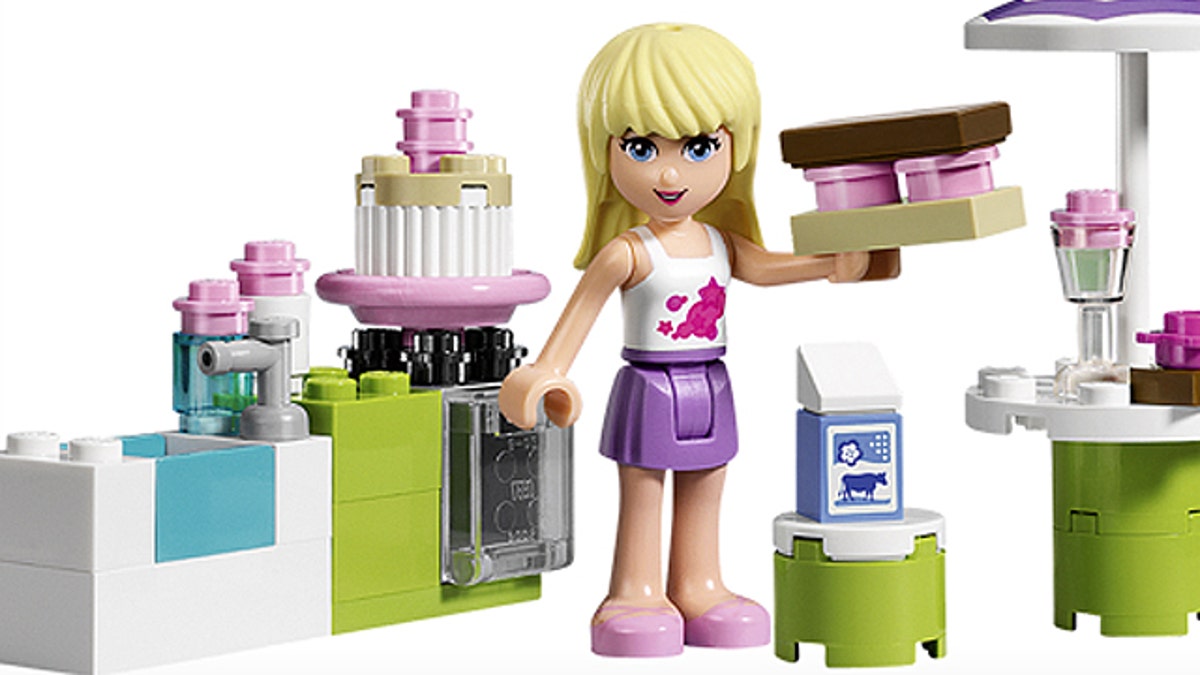
The new “Lego Friends” line rolled out in December features LadyFigs, curvier takeoffs on the traditional boxy figurines that live in a place called Heartlake City. Shown above is a set depicting "Stephanie's Outdoor Bakery." (LEGO.com)
A feminist group has identified the enemy, and it is ... LEGOs?
The Danish company behind the interlocking plastic building blocks loved by children since 1949 has a meeting set for Friday with a Brooklyn group ticked off with LEGOs product line designed to appeal to girls.
The new “LEGO Friends” rolled out in December featuring LadyFigs, curvier takeoffs on the traditional boxy LEGO men. Construction sets include a hot tub, a splash pool, a beauty parlor, an outdoor bakery and a “cool convertible," as well as an inventor's workshop.
But the SPARK Movement objects to the "LadyFigs," the female version of the little figures who man the spaceships, trucks and forts children create. "Ladyfigs" are somewhat anatomically correct, which hypersexualizes girls, according to the group.
"They have little breasts and they have fancy hair," the organization's executive director, Dana Edell, told FoxNews.com. "And it just disturbs us that this is the image that they want girls to see."
Edell also objects to what she calls stereotyping of preferred pastimes for girls.
"What it's doing is telling girls that this is what's important to you," Edell said of the beauty parlor and hot tub sets. "Girls aren't building space shuttles, they're getting their nails done."
But not everyone thinks LEGOs for girls should have parents ready to snap.
[pullquote]
Dr. Leonard Sax, author of "Why Gender Matters: What Parents and Teachers Need to Know About the Emerging Science of Sex Differences," said gender differences are natural, and that while some girls may prefer traditional LEGOs, there is nothing wrong with the company offering what it sees as a girl-friendly version.
According to Sax, even animals in the wild show differences along gender lines from the earliest ages.
"These particular women's groups are disconnected from reality in their desire to promote the idea that these gender differences are taught by the patriarchy or through socialization," Sax, who also authored "Boys Adrift" and "Girls on the Edge," told FoxNews.com. "The sexualization of children is indeed an important issue, but this is not a part of that."
Edell's group has gotten 55,000 signatures as of Thursday decrying the gender-specific LEGO sets. That was enough to leverage a meeting with top LEGO executives in Manhattan at 10:30 a.m. Friday.
"We agreed to a private meeting with the organization upon their request to hear their feedback on our new product line," LEGO Systems Brand Relations Director Michael McNally told FoxNews.com. "We value external perspectives -- critical or complimentary -- as inspiration for exploring development of the LEGO brand."
But the company may listen more closely to customers than critics. McNally said the girl-targeted line is selling well, and generating positive feedback from parents.
Others told FoxNews.com they were puzzled why some oppose the toymaker's decision to provide a more diverse product line.
"I understand that they're offended by the limited, old-fashioned way in which LEGO has feminized the new line -- with traditional feminine characters and colors -- but they should embrace the fact that LEGO is providing new choices for families and children," said Nicole Ciandella, whose blog, Free-MarketFeminism.com, regularly takes on issues like gender, politics and economics.
"SPARK seems to oppose any expression of traditional, old-fashioned femininity, but why? Shouldn't parents have the option of purchasing toys that express traditional masculinity, traditional femininity, and everything in between?"
LEGO isn't suggesting that girls be limited to playing with traditionally-feminine toys, but is instead giving parents options, Ciandella said.
"The beauty of the free market is that it enables consumers to make their own choices about the environments they wish to create in their own homes."
Edell, meanwhile, said she's looking forward to telling LEGO executives to better focus their efforts to producing toys that expands the "mind and creativity" of girls and boys alike.
"Our world has become more and more sexualized," Edell said. "And the toy industry has become that way as well."

